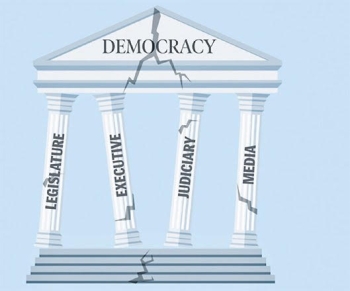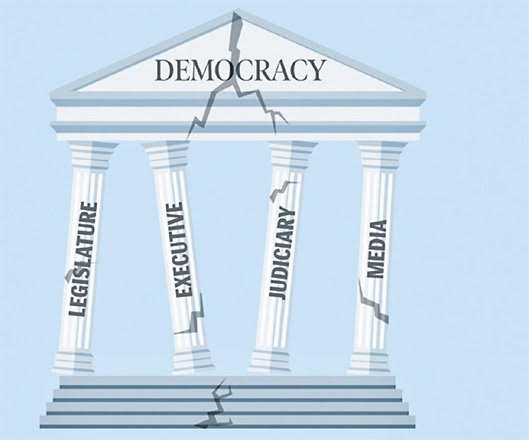
.jpg) Mathew John
Mathew John

The Americans have a beguiling way with words. Masters of euphemism, they couch the most unpleasant reality in language that is polite but with spadefuls of deception. When they fire you, the world is told that they “let you go”; they do not tell lies but purvey “alternative facts” or are “economical with the truth”; the genocide of the Native American Indians is sugar-coated as “ethnic cleansing”.
In like vein, what was earlier blandly known as the Fourth Estate is now “civil society” -- a nice genteel term coined in America to describe an amorphous, self-serving aggregation of community members outside the legislature, political executive and the judiciary who supposedly represent the common man and his interests. But, as pointed out by a leading sociologist, this essentially status-quoist grouping is mainly middle class in its orientation and concerns, and disconnected from popular struggles of trade unions, peasant organizations and the like that defend people’s rights and promote their welfare.
Historically, society has always been viewed as a consortium of diverse, often conflicting interests. In pre-modern times, there was the trifurcation into the nobility, the clergy and the subservient commoners. With the execution of King Louis XVI in the French Revolution, the consequent diminishing of the monarchy and the bloody advent of democracy, society was carved up into four Estates – the legislature, the political executive, the judiciary and the fourth estate comprising forces outside the established power structure, in particular the media. In today’s web-saturated world of instant communication, we now have a Fifth Estate made up of social media, bloggers and “networked individuals” empowered by the internet, that has overwhelmed every other medium of human interaction and even, dare I say, human gratification.
But my theme is civil society as the outlier in the power structure and its contribution to making the world a better place for the ordinary citizen. Till not so long ago, social scientists believed in the power of civil society to bring about transformative change. The great humanist and thinker, Howard Zinn went so far as to describe civil society as “the ultimate power” and “the locomotive that drives the train of government in the direction of equality and justice”. He passionately believed that ordinary people could bring down unjust institutions and change discriminatory policies through direct nonviolent action. He had in mind our own Independence movement, Martin Luther King’s civil rights crusade and the anti-Apartheid movement in South Africa.
But in our cruel world where power is concentrated in the dominant one percent who get exactly what they want at the cost of everyone else, the people’s fight for justice has had many more misses than hits. The Occupy Wall Street movement (OWS), which was a full-throated protest against corporate abuse and greed that had widened the chasm between the privileged and the rest, sent seismic ripples across the world and yet neither transformed society nor impacted growing social and economic equalities, thereby underlining the brute power and resilience of the reigning oligarchies. Even the Arab Spring protest movements, although largely successful in dismantling repressive elitist regimes, could not prevent a return to the old playbook of gender discrimination, religious fundamentalism and other regressive practices. At home, the unique anti-CAA protests spearheaded by women, was ultimately routed by the brute power of a majoritarian State, its foot soldiers and a pre-planned riot. The boomeranging of these civil society protests is a grim reminder that the pursuit of social justice is an eternal, often misfiring, endeavour. And yet we need to persist! Ralph Nader was spot on in his belief that an equal and just society is not possible without the active participation of its main stakeholder i.e., civil society. To quote his wisdom, “There can be no daily democracy without daily citizenship.”
But what hope is there when civil society is embroiled in an internecine fight to the finish, which is what is happening in this country today? Significantly, civil society in our country has rarely focused on the common good but on fragmented, sectarian interests. Apart from profession-based agitations by trade unions, the first major mobilization of the citizenry since Independence was the Ramjanmabhumi movement that gave a foretaste of where we were headed as a nation. The movement cynically exploited religious sentiment for political purposes, reducing Hinduism to the insular political ideology of Hindutva. Setting aside the basic liberal values of tolerance and inclusion, the religious symbols and religiosity of the majority community are aggressively flaunted in the public square, and religion has become an even more potent tool than caste in determining political outcomes. Behind the veneer of democracy, an emboldened politico-religious party has encouraged and fostered schisms within society by playing on the fears and insecurities of ordinary citizens and mobilizing the hordes to target ‘the other’.
Fast forward to 2014 and the rapid descent to hell for one minority group. Amid the triumphalism and joyous mass hysteria that accompanied the general elections in 2014, my dearest friend - a Muslim – said despondently, “I feel more alone than ever!” His anguish stemmed not from the fact that a man who is alleged to have presided over the genocide of Muslims in 2002 had ascended the highest post but from the frightening realization that a major reason for the thunderous endorsement was the widespread elation that this superman knew how to deal with Muslims. Many of our associates thumped their chests in pride at this assertion of Hindu power, knowing full well what was in store for the victims.
A brutal truth is that this country, once the land of Buddha and Gandhi, has been taken prisoner by a regime that has no respect for human life, justice or freedom. And the takeover has been effortless because there has hardly been any resistance from “civil society”. That should come as no surprise as our value systems have been inexorably corroded through the Sangh Parivar’s meticulous “cultural” conditioning of minds in the Shakhas, the network of educational institutions, the personal contact by its cadres, even through the Amar Chitra Katha comic series in what Sumit Sarkar terms “a Gramscian process of building up hegemony through molecular permeation”. At the heart of this relentless, century-old indoctrination is the pathological hatred of the Muslim and everything he represents – his food, attire, history and even his overtures of love. Communal prejudice is now common sense! Today, this venomous stigmatization of an entire community is not only an acceptable everyday reality but even more frightening, a perverse marker of one’s nationalism. What hope is there for solidarity in civil society amid such deep-rooted schismatic antipathy?
A big setback to any kind of effective consolidation of a people’s movement against injustice has been the methodical undermining of solidarity among the working class, historically the one section that transcended community and caste. The reigning philosophy of neoliberalism, with profit, not people, at its heart and constructed on the illicit alliance between the State and the Corporates, has successfully targeted and neutralized trade unions across the world through arm-twisting and inducements.
One cannot conclude without a look at my kind of folk who swear (under their breath) by liberal values, but otherwise constitute that despicable, spineless section of civil society who think that their muted disapproval of this evil regime sets them apart from the active collaborators. These are the guys constantly looking over the shoulder, afraid to express their views even among colleagues or in informal gatherings, lest it become known that they look askance at this regime. Nobody is pressurizing them to be in the vanguard of activism using the arsenal of civil disobedience tactics such as dharnas, boycotts or strikes but is it asking too much to expect them as honourable citizens to air their dissident views at least among the people they interact with on a regular basis, because every voice for justice, however faint, matters? Sadly, such craven expedient silence has encouraged the impunity of the tyrant and his minions who know that these fence-sitters are their great allies by default.
It is then no surprise that the oppressor is the most popular leader in the world with an approval rating of 70 percent although, incongruously, his party has never garnered more than 37 percent of the popular vote. But quibbling aside, I should like to remind this “forgetting all but self” crowd of close-mouthed non-combatants of Dr Martin Luther King’s rebuke: “In the end, we will remember not the words of our enemies but the silence of our friends.”
(The writer is a former civil servant. The views are personal)